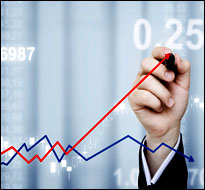Income inequality in the United State has grown sharply in recent decades, as both academic studies and government data demonstrate. Given the heightened divisions between classes, it might seem reasonable to assume that those at the bottom would be more pessimistic about the U.S. economy and those at the top more positive. However, such a divergence has not necessarily been realized, according to a 2011 study from Georgetown University.
Published in Public Opinion Quarterly, “Whose Economy? Perceptions of National Economic Performance During Unequal Growth,” analyzes the Michigan Surveys of Consumer Attitudes over the period 1978-2010 — a total of 215,723 respondents — and correlates that data with various economic indicators. The 2011 study notes the sharp increase in the concentration of wealth among the highest tier of earners over the past 30 years: “At the 20th percentile, real incomes grew by only 8 percent in this period. At the 80th percentile, they grew by 26 percent, while at the 95th percentile they grew by 41 percent.” The researcher ultimately looks at whether or not the idea of “two economies” may also translate into polarized worldviews about economic performance.
The study’s findings include:
- Perceptions of economic health on average do not appear to vary among income groups despite the growing disparities: “When asked about the nation’s economy, Americans at various income levels give answers that are quite similar.”
- The data suggest that “rich and poor, Americans usually agree when asked about the state of the national economy.” In addition, “Americans at all income levels weigh income growth at the low end in their responses. When Americans report that the state of the economy is good or bad, they are reporting not only for the wealthy, but for the poor as well.”
- Perceptions of economic well-being appear to be tied to the growth outcomes for the lowest-income earners: “Low-end income growth is the strongest and most consistent predictor of Americans’ … assessments of the economy’s past performance.”
- This dynamic is consistently diminished during elections: “Low-income growth is less influential … at precisely the points in time when Americans are asked to cast their presidential votes.” Moreover, the diminishing power of this effect during campaign periods results in less pressure to “ensure that elected officials are held accountable for growth among poorer Americans. But it does not mute the underlying pattern that when Americans are assessing economic performance, their answers are most reflective of low-end income growth.”
The author summarizes his findings as follows: “Poor Americans have not become more pessimistic about their personal finances because others have been earning more. The same empirical trends hold for wealthy Americans, although that group has experienced considerable income growth.” The researcher writes that this should “caution us against assuming that the wealthiest are necessarily the benchmark used by those lower in the income distribution. Framing the issue as ‘income inequality’ encourages the assumption that low-income Americans are assessing themselves relative to those Americans in upper-income brackets. But while income is increasingly concentrated at the top, optimistic personal assessments are not.”
Tags: poverty, economy


Expert Commentary